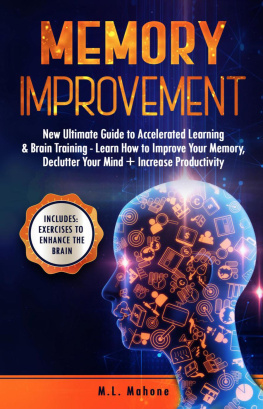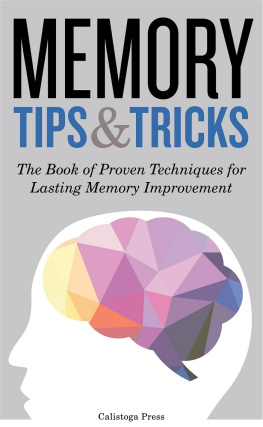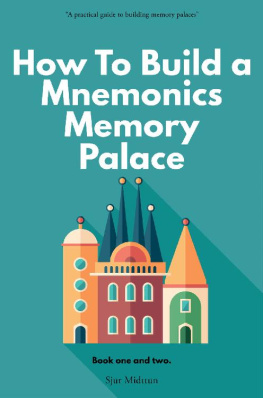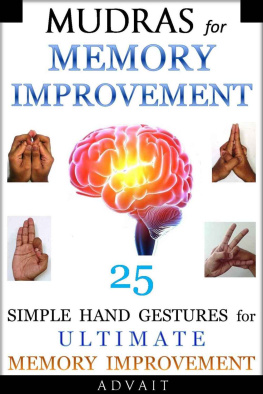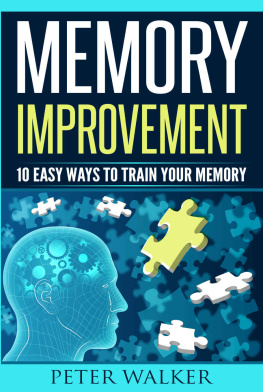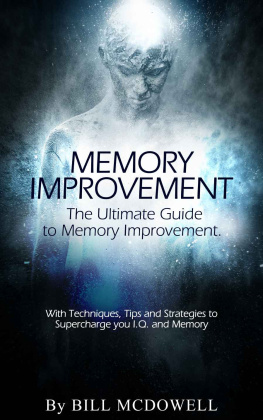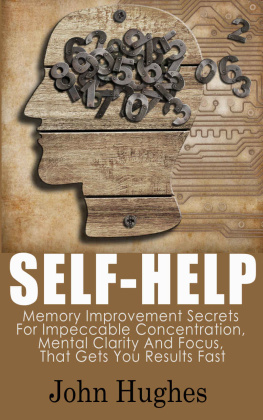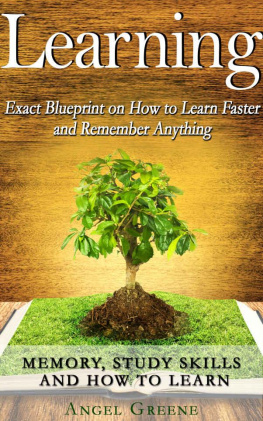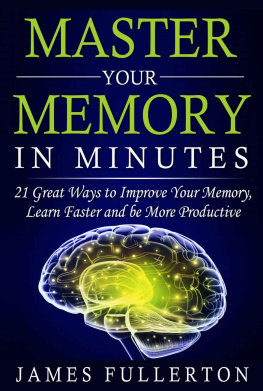Memory Improvement Book
The Mnemonics
Mind and Memory Improvement for Adults
Andrew Kite
Copyright 2020 - All rights reserved.
The content contained within this book may not be reproduced, duplicated or transmitted without direct written permission from the author or the publisher.
Under no circumstances will any blame or legal responsibility be held against the publisher, or author, for any damages, reparation, or monetary loss due to the information contained within this book, either directly or indirectly.
Legal Notice:
This book is copyright protected. It is only for personal use. You cannot amend, distribute, sell, use, quote or paraphrase any part, or the content within this book, without the consent of the author or publisher.
Disclaimer Notice:
Please note the information contained within this document is for educational and entertainment purposes only. All effort has been executed to present accurate, up to date, reliable, complete information. No warranties of any kind are declared or implied. Readers acknowledge that the author is not engaged in the rendering of legal, financial, medical or professional advice. The content within this book has been derived from various sources. Please consult a licensed professional before attempting any techniques outlined in this book.
By reading this document, the reader agrees that under no circumstances is the author responsible for any losses, direct or indirect, that are incurred as a result of the use of the information contained within this document, including, but not limited to, errors, omissions, or inaccuracies.
Table of Contents
Introduction
There are moments when I get up from the sofa, wander into the bedroom, and stare at the bed for a minute, trying to remember why I went in there in the first place. My mind is a blank sheet; it doesnt matter what I tryuntil I have sat back in my chair, I just wont remember why I got up. This happens when Im in the middle of conversations and I cant remember what I was going to say next. Or, I walk out of my office, only to go straight back in because I simply cannot remember the reason I left my chair in the first place.
The brain is amazing. It is capable of storing huge amounts of information, whether the details are important or not. This organ is capable of solving incredibly complex problems. Consider string theory; physicists have been able to come up with and prove astounding theories that are anything but simple. If you arent a scientist, your brain is just as capable of computing information. Solving mathematical equations, assessing situations, creating complicated business plans, or philosophizing are all examples of the power of the brain.
While we may consider our brains to be supercomputers and expect that they should be able to store and recall information without a glitch, there are a number of reasons why our memory sometimes lets us down.
The Problem
As we age, we tend to realize that our memory isnt what it used to be. This can be extremely frustrating because memory (or lack thereof) plays a huge role in our everyday lives.
There are seven common and normal memory problems that become more prominent the older we get. These are known as the Seven Sins of Memory (Schacter, 2007).
They are:
Transience
Absentmindedness
Blocking
Misattribution
Suggestibility
Bias
Persistence
Its important to note that although age is a factor in these memory problems, the very same can occur in younger people. Now that we are aware of the Seven Sins of Memory, let's have a brief look at what each of them means and how they affect our everyday life.
Transience
Forgetting the details of events or facts that arent relevant happens over time. This is what transience is. Memories that are recalled frequently are more likely to be remembered while those that are infrequently called upon may fall by the wayside. Although transience can be frustrating when you are trying to remember the name of the child you grew up next door to, scientists consider this type of memory loss to be beneficial, as it makes space in the brain for memories that are more useful to us.
Absentmindedness
Simply put, this is when you aren't paying attention to what you are doing. An example is putting your car keys in the refrigerator with the milk when you get home from the store. Your body continues to act, but your brain doesnt convert these actions into memory.
This explains why you have no recollection of placing the car keys in the refrigerator. Its as though your body is continuing, but your mind is absent.
Blocking
Have you ever been in the middle of something and you suddenly couldnt remember how to do it? Maybe you have been in the middle of a conversation and wanted to say something specific, but it just doesnt come out. You know that you know the answer, but you just cant recall it. Perhaps a few minutes or even hours later you remember the answer.
Thats what blocking is. The memory is there, but for whatever reason, your brain just cant access it at the time.
Suggestibility
The power of suggestion can lead to what is probably the best trick of the brain. When you think back to your childhood, you may recall your pet dog as being brown in color. However, your sibling says the dog was black. After a period of time, your brain will remember the dog being black. Your memory is altered by consistent suggestion, and over time, you will recall this memory incorrectly every time it comes up again.
Bias
The way memories are created, stored, and recalled can be affected by how were feeling at the very moment. Beliefs, emotions, situations, and external influences that are present in the moment of memory creation or recollection can alter the way our brains see the memory.
Misattribution
Many of you may know this memory sin by its common name, false memory. False memory is a confusing phenomenon because in most cases the memory is not false at all, but the context of the memory is remembered incorrectly.
Misattribution is probably the most well-known of the memory sins. It has garnered much more attention than the others due to its potentially damaging effect in courtrooms.
As an example, an eyewitness may be extremely confident in pointing out the man they believe to be an armed robber they saw committing a crime. In actual fact, the man they are pointing out may be the cashier at the store in which the robbery occurred. The eyewitnesss memory is not incorrectthey did indeed see the man at the time of the robbery. The context of their recollection is where the problem lies, and as such, they have attributed the incorrect action to the face they recall.
Persistence
Persistence can be considered, in a way, to be the opposite of most memory problems. Instead of forgetting, the brain attaches to a particular traumatic memory and plays it on a loop. PTSD is the most well-known example of persistent memory. The reason this is seen as a memory sin is that constant replaying of traumatic memories keeps one in a consistent loop of negative emotions that can have extreme mental and physical effects.
Aside from the Seven Sins of Memory, there are outside influences that also affect recollection.
These factors are:
Stress and anxiety
Sleep deprivation
Decreased sleep quality
Thyroid malfunction
A vitamin B12 deficiency
Depression
Alcohol abuse
Medication
Stress and Anxiety
Modern life is stressful. We constantly seem to be rushing from one deadline to another or from one place to another. All this action increases the levels of adrenaline, norepinephrine, and cortisol in our bodies. This reaction served us well in the distant past when we came face-to-face with danger. But in a world where our brains are saturated with information, the feeling of being overwhelmed is often misinterpreted by our ancient survival instinct as being a threat. So, this reaction becomes harmful, as the levels of stress hormones remain elevated all the time.



